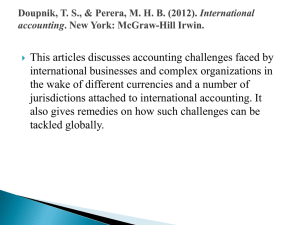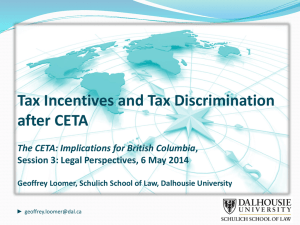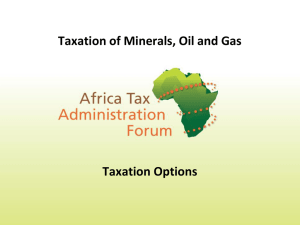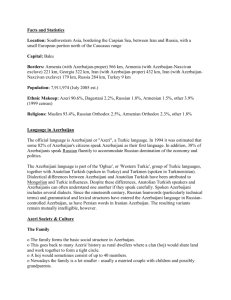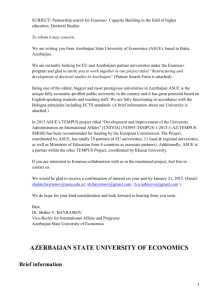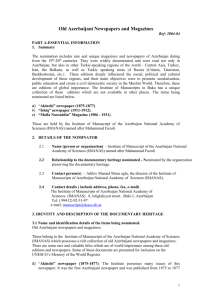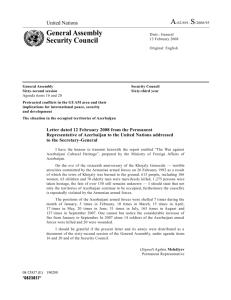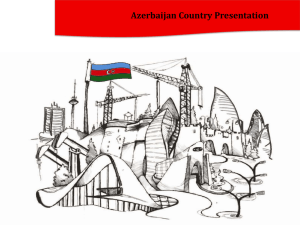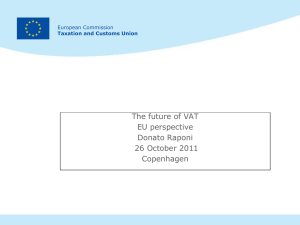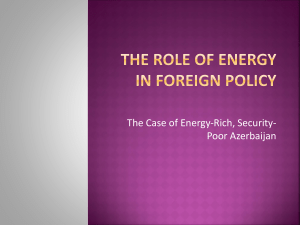Aykhan Asadov
advertisement
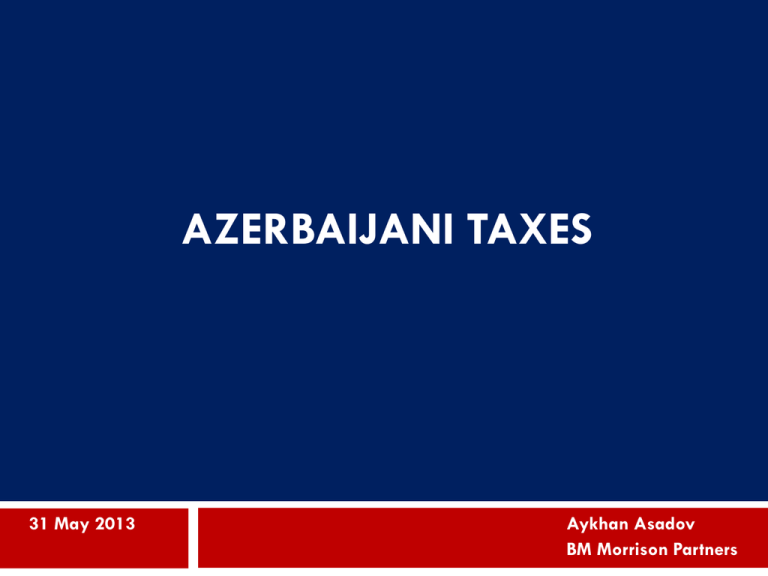
AZERBAIJANI TAXES 31 May 2013 Aykhan Asadov BM Morrison Partners Azerbaijani Taxes • Overview • • Tax Code Special Tax Regimes • • • • Role of Taxes in Azerbaijani Economy Double Taxation Avoidance and Other Tax Treaties • • • • Commercial Agreements Approved into Law Promotion of Exports Status Preferences Granted Summary Trade in Goods • • • Forms of Foreign Supplies in Azerbaijan Taxable Permanent Establishments Sales Structures • Commissionaire Structure • Value Added Tax (VAT) Tax Code • Tax Code effective 2001 • Post 2001: substantive refining tax system • • Adoption of 2005-2007 State Program for Improvement of Tax Administration: emphasis shifts on streamlining tax compliance and control procedures Improvements continue as a part of e-government formation program and initiative Tax Code • State, Autonomous Republic, and Local Taxes • All taxes are those listed in Tax Code • Profits Tax (CIT) – 20% • VAT – 18% or 0% • Individual Income Tax – progressive taxation, three brackets: 0%, 14%, and 25% • Social Security Charge – 22% payable by employer, 3% payable by employee • Property Tax – 1% • Subsoil Use Taxes • Excise Tax • Land Tax • Highway Tax • Simplified Tax (4% or 2% on gross proceeds) Special Tax Regimes • • Commercial Agreements Approved into Law PSAs (most notably, in oil and gas) and Host Government Agreements • exemptions differ between contractors and subcontractors: • contractors are subject to: • • • • • subcontractors (except under major pipeline agreements) are subject to: • • • the profits tax profits tax is typically included in the government’s take of profit oil bonus payments acreage fees the withholding tax VAT at 0% only resident employees are subject to income tax Special Tax Regimes • • Export of Oil and Gas infrastructure • Azerbaijani businesses have an option to be taxed under 5% tax on gross proceeds with no withholding taxes applicable to dividends, interest, or PE net profit, exempt from the property and land taxes • as with other exports from Azerbaijan, export of oil and gas infrastructure from Azerbaijan is subject to VAT at 0% Agriculture • income of individuals is exempt from personal income tax, highway tax does not apply to vehicles engaged in agriculture • termed exemption to agricultural sector from profits tax, simplified tax, VAT, and property tax • reduced rate of social charge applies to personal income from agriculture Role of Taxes in Economy • Share of oil revenues in GDP of Azerbaijan is 48.5% (down from 56% in 2010) while the share of agriculture, forestry, and fishing is 2.5% (down from 9.3% in 2010) • Tax exemptions can generally be considered effective • Percentage of tax revenues in Azerbaijani GDP is 6.7% (17.8%?) • • Cannot be considered high when compared to developed countries (can be as high as 50% of GDP) or OECD “unweighted” average of roughly 34% Azerbaijan is doing relatively well when compared to average tax burden in oil-producing countries where tax revenues can be as low as 1% of the GDP or non-existing Double Taxation Avoidance Treaties • • • • • 40 Effective Treaties USSR Treaties Not Recognized Except Specifically Agreed Treaties with Most Popular “Onshore” Jurisdictions Treaty with UAE by Far Most Favorable Implementation Procedures • • Advance Clearance Refund Double Taxation Avoidance Treaties • • • Residents PE Exemption from Withholding Tax Except for • • • • • Dividends Interest Royalties Possibly, Exemption from Branch Profits Tax Procedural Matters Other Agreements • • • • Tax Compliance Cooperation and Mutual Assistance Agreements (also, multilateral within CIS) Agreement on Cooperation and Information Exchange in Combatting Tax Evasion Agreements on Principles of Indirect Taxation upon Export and Import of Goods (Works and Services)/Bilateral Trade Cooperation Agreement between Tax Authorities Trade in Goods • Forms of Foreign Supplies in Azerbaijan • • No Presence Presence through Intermediaries (Dealerships and Similar), Various Sales Structures • • • • Commissionaire Structure – Ownership Remains with Principal For VAT Purposes, Owner is Commissionaire – Removes Complexities where Principal is Non-Resident “Self”-Presence – PE Full Presence – Subsidiary Questions & Comments? Thank you!


